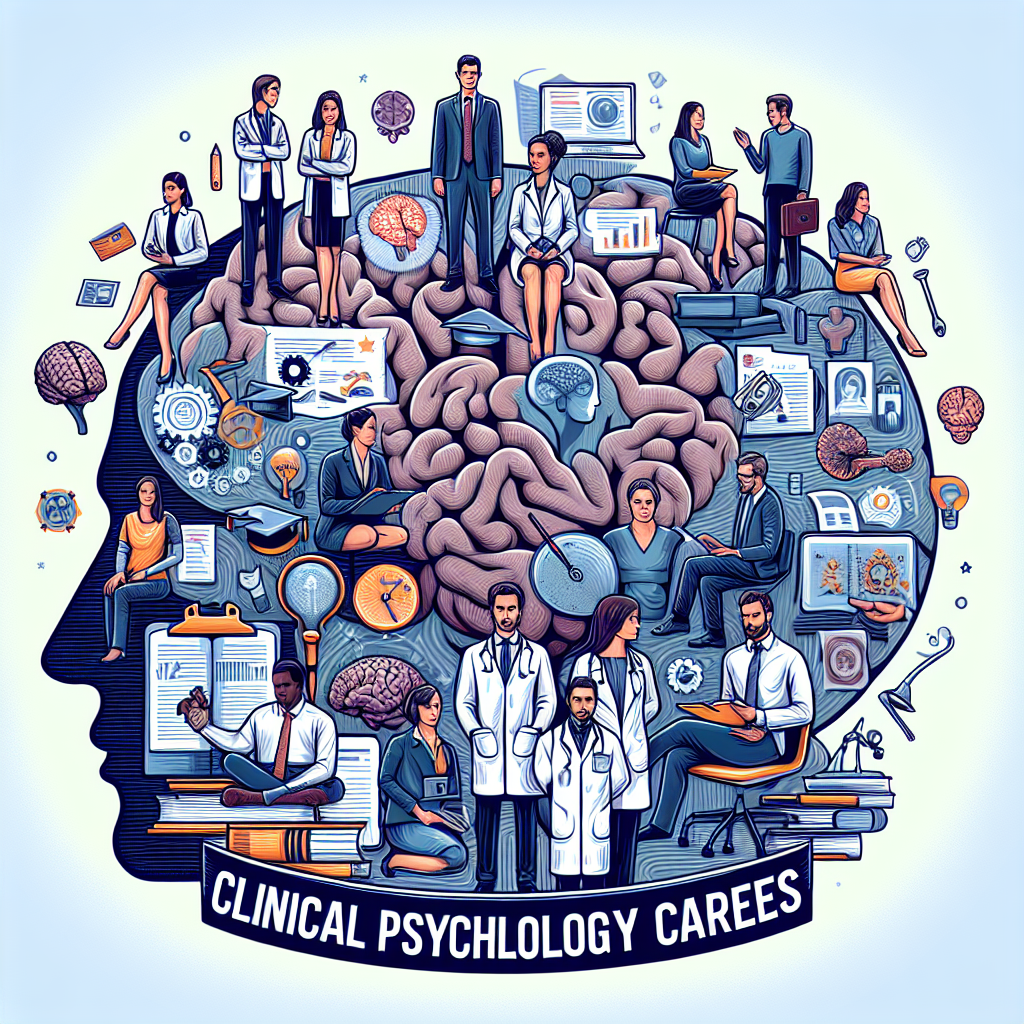
Introduction
In an ever-evolving world where mental health awareness is steadily gaining momentum, the quest for effective psychological care has taken center stage. Clinical Psychology Careers: A Deep Dive into Job Opportunities and Specializations illuminates the myriad paths aspiring psychologists can take, shedding light on the profound impact they can have on individuals and communities. This article will explore the diverse career trajectories within clinical psychology, providing you with valuable insights into specializations, job opportunities, and the real-world implications of this compelling field.
Understanding Clinical Psychology
Before diving into specifics, it’s essential to grasp what clinical psychology encompasses. Clinical psychologists assess, diagnose, and treat mental health disorders, employing various therapeutic approaches tailored to individual needs. They work in settings ranging from hospitals and private practices to schools and research institutions.
Core Responsibilities of Clinical Psychologists
- Assessment and Diagnosis: Evaluating clients through interviews, behavioral assessments, and standardized tests.
- Therapeutic Intervention: Providing therapy sessions using different modalities, including cognitive-behavioral therapy (CBT), humanistic therapy, and psychoanalytical approaches.
- Research and Advocacy: Conducting studies to enhance psychological practices and advocating for mental health in broader contexts.
Importance of Clinical Psychology
The significance of clinical psychology transcends personal healing. It touches societal well-being, influencing how communities approach mental health challenges. Understanding this breadth should inspire aspiring psychologists to realize the critical role they can play in enhancing overall quality of life.
Educational Pathways to Clinical Psychology Careers
Navigating the educational journey is crucial for anyone looking to excel in Clinical Psychology Careers: A Deep Dive into Job Opportunities and Specializations.
Degree Options
Bachelor’s Degree in Psychology: The preliminary step to understanding fundamental concepts.
Master’s Degree in Clinical Psychology: Often a stepping stone for those looking to begin therapy or work in organizational settings.
- Doctoral Degree (Ph.D. or Psy.D.): Required for licensure, these programs delve deeply into clinical practice, research methodologies, and advanced therapeutic techniques.
Licensure Requirements
Licensure requirements vary by state but generally include:
- Completion of an accredited doctoral program.
- A specific number of supervised hours (internship/residency).
- Passing a national examination (EPPP).
Continuing Education
Continued professional development is essential in clinical psychology. Clinicians must engage in additional training to stay abreast of emerging research, methodologies, and ethical standards.
Job Opportunities: Where Do Clinical Psychologists Work?
The landscape of Clinical Psychology Careers: A Deep Dive into Job Opportunities and Specializations is rich with diversity, ranging from traditional clinical settings to innovative research environments.
1. Private Practice
Case Study: Dr. Emily Flores, a clinical psychologist in private practice, specializes in anxiety disorders. Through personalized treatment plans, she has significantly improved her clients’ coping strategies, reflecting the profound personal touch that private practice can offer.
Analysis: Working in private practice allows psychologists to build individualized therapeutic relationships and maintain flexibility in treatment approaches.
2. Hospitals and Health Systems
Clinical psychologists in hospitals often work alongside medical professionals to provide integrated care. Their focus may include:
- Psychological assessments for medical patients.
- Crisis intervention in emergency settings.
3. Schools and Educational Settings
School psychologists play a pivotal role in assessing and addressing the mental health needs of students. They collaborate with educators and parents to create supportive learning environments.
Case Study: A school psychologist, Mr. David Chen, implemented a mindfulness program that resulted in a 30% reduction in behavioral issues among students.
Analysis: By addressing mental health in educational settings, psychologists contribute significantly to student well-being and academic success.
4. Research Institutions
Researchers in clinical psychology examine various psychological phenomena, contributing valuable insights to the field. These roles often involve:
- Designing studies.
- Analyzing data.
- Developing new therapeutic methods.
5. Government and Non-Profit Organizations
Psychologists often collaborate with community organizations to design and implement programs addressing specific mental health issues, such as substance abuse or trauma recovery.
Specializations in Clinical Psychology
Specializing within clinical psychology allows professionals to focus their passion and expertise on specific populations or disorders.
1. Child and Adolescent Psychology
This specialization focuses on the mental health needs of children and teenagers. Professionals often work in schools or pediatric settings.
Case Study: Dr. Lisa Patel specializes in developmental disorders, focusing on interventions in autism spectrum disorders. Her innovative approach has led to better communication outcomes for her young clients.
2. Neuropsychology
Neuropsychologists assess and treat cognitive deficits resulting from brain injury or illness. They utilize specialized testing to identify cognitive impairments.
3. Forensic Psychology
Forensic psychologists apply psychological principles in legal contexts, conducting assessments related to competency, insanity defenses, and custody evaluations.
Case Study: In a high-profile custody battle, Dr. Angela Romero conducted assessments that provided critical insights, influencing the outcome.
Analysis: The role of forensic psychologists underscores the intersection of mental health and legal considerations, illustrating the importance of psychological evaluations in the justice system.
4. Health Psychology
Health psychologists focus on the interplay between emotional and physical health. They often work in clinical settings to help patients manage chronic diseases and promote healthier lifestyles.
5. Clinical Geropsychology
This specialization addresses the mental health needs of older adults, emphasizing issues such as dementia, depression, and grief.
Skills and Qualities Essential for Success
To thrive in Clinical Psychology Careers: A Deep Dive into Job Opportunities and Specializations, certain skills and qualities stand out:
- Empathy and Compassion: Building rapport with clients is essential for effective therapy.
- Analytical Skills: The ability to interpret complex psychological data is crucial for accurate diagnosis and treatment planning.
- Communication Skills: Clearly articulating thoughts and empathizing with clients enhances therapeutic relationships.
The Future of Clinical Psychology Careers
The landscape of clinical psychology is evolving, influenced by advancements in technology and changing societal attitudes toward mental health. Innovations such as teletherapy and digital mental health apps are reshaping how psychologists provide care.
Emerging Opportunities
As awareness of mental health continues to grow, new opportunities will arise in various settings, from corporate environments to innovative tech-driven platforms for mental health services.
Conclusion
In conclusion, Clinical Psychology Careers: A Deep Dive into Job Opportunities and Specializations reveals a dynamic and impactful profession with myriad pathways. From traditional clinical settings to pioneering research roles, the opportunities are vast and varied. Those who choose to pursue a career in clinical psychology will not only find personal fulfillment but also have the unique chance to contribute to the broader societal understanding of mental health. Whether you’re a student researching the field or a professional considering a specialization, remember that your journey in clinical psychology can profoundly influence lives for the better.
FAQs
1. What is the typical salary range for clinical psychologists?
Salaries vary widely based on factors such as location, specialization, and experience level. On average, salaries can range from $60,000 to over $100,000 annually.
2. What is the difference between a Ph.D. and a Psy.D. in psychology?
A Ph.D. is research-focused, emphasizing scholarly contributions to psychology. A Psy.D. focuses on clinical practice and prepares students for professional roles in therapy.
3. How long does it take to become a clinical psychologist?
It typically takes 8-12 years of education and training, including undergraduate studies, graduate programs, and postdoctoral experience.
4. Are there specific certifications for specializations within clinical psychology?
Yes, many specializations offer certifications, which can enhance credibility and job prospects. These may require additional training and examinations.
5. How can I find the right specialization for me?
Consider your interests, strengths, and experiences. Speak with professionals in the field, engage in internships, and explore different settings to determine the best fit for your career.
With this comprehensive analysis, you are now equipped to navigate the exciting world of Clinical Psychology Careers: A Deep Dive into Job Opportunities and Specializations, empowering you to make informed decisions about your future in this transformative field.














